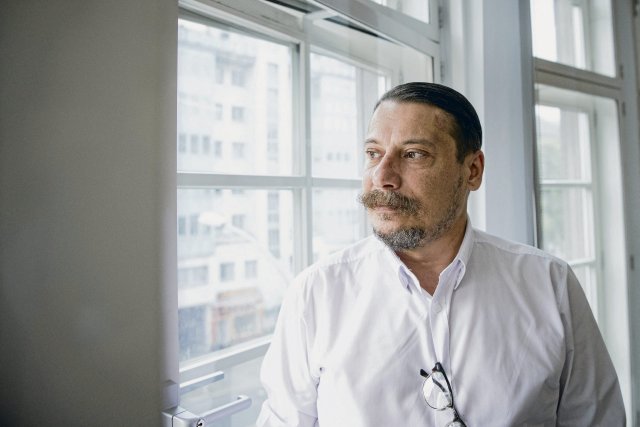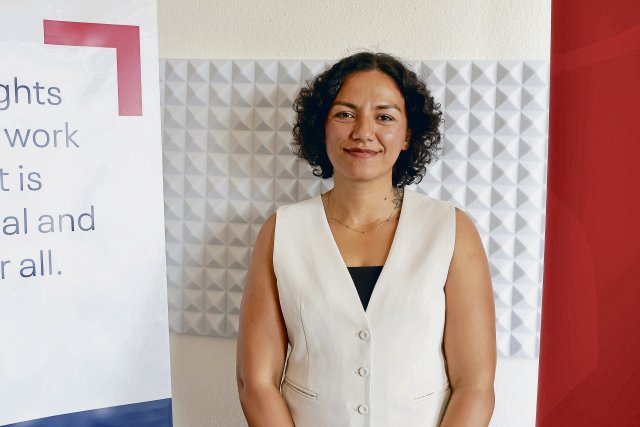Transnational Persecution | Dissidents in Germany: "You Stop Writing!"
The murder occurred in the middle of the day in a busy place. Zelimkhan Khangoshvili was murdered with three pistol shots in Berlin's Kleiner Tiergarten park on August 23, 2019. He belonged to the Chechen minority in Georgia and had fought in high military ranks against Russia in the Chechen wars until 2009.
Just minutes after the crime, the murderer, Vadim Krasikov, was arrested near the crime scene. Krasikov was a Russian agent. The Berlin Higher Regional Court later ruled it a contract killing by the Russian secret service and sentenced Krasikov to life imprisonment. He didn't serve much of his sentence, however. He was released early in 2024 as part of a prisoner exchange. Official Moscow welcomed him as a hero. This also sent a message to all critics of the regime: They should never be safe anywhere.
Everyday intimidationSuch murders fortunately do not occur frequently, but the daily threat is significant. Intimidation and physical attacks against journalists, exiled politicians, and refugee human rights activists by the intelligence services of their countries of origin are a normal part of life for many people. Political opponents are meant to be discouraged and critical voices silenced.
When investigative Egyptian journalist Basma Mostafa came to Berlin in 2021, she believed she was safe. She had served three prison sentences for reporting on abuses as a journalist. For example, she had written about the murder of an Italian student by Egyptian security forces. Behind her lay years of fleeing through unsafe countries until she finally found refuge in Europe. A false assumption. While attending an international conference in Geneva, an Egyptian man openly threatened her: "I know you. You are Egyptian, and I am a police officer and can arrest you immediately." The wording can be read in the minutes of a 2023 parliamentary meeting in the German Bundestag. Interested members of the Bundestag from various parliamentary groups once again exchanged views with those persecuted the topic of transnational repression – that is, the persecution of people across national borders – the following year.

Among the participants was Chinese journalist Su Yutong , whose fate exemplifies the scope of transnational persecution. She fled to Germany in 2010 after distributing diaries by former Premier Li Peng, the man primarily responsible for the Tiananmen Square massacre in 1989. The book remains banned in her homeland to this day.
But even in Germany, from where she continued to raise her voice against human rights violations in China, China's authoritarian state persecuted her. And they did so using a perfidious method: Her address and photos were published on sex dating sites, so that strange men constantly rang her doorbell, wanting sex with her, Su told the MPs.
She was threatened via WhatsApp and social media, photographed at demonstrations against the Chinese government, and intimidated. Unknown individuals booked hotel rooms around the world using her personal details, in such a way that intelligence agencies linked her to bomb threats against a hotel. As a result, the police even investigated the alleged bomb maker. Today, Su Yutong is protected by the police, who also advised her to move. Her new address is now secret.

Another guest in the Bundestag was Turkish journalist Erk Acarer , who was attacked and beaten by three men in the courtyard of his Berlin apartment building in 2021. One of them shouted in Turkish: "You stop writing." He identified the men as fascist forces from Turkey. In his opinion, the long arm of the authoritarian Turkish leadership reaches into Berlin's backyards.
Journalists in the crosshairsThese cases are symptomatic: According to the non-governmental organization Freedom House , at least twelve foreign governments are said to have persecuted their own citizens on German soil in the past ten years. These include China, Russia, Belarus, Egypt, Turkey, Vietnam, Iran, and Azerbaijan. The number of unreported cases is likely much higher, as the organization has only recorded publicly known incidents, such as the Tiergarten murder or the kidnapping of the renegade Vietnamese official Trinh Xuan Thanh from exile in Berlin to a Hanoi prison in 2017.
Transnational persecution often affects journalists. Four of the five guests at the first parliamentary meeting in 2023 work in the media industry. In 2024, there were two guests, both members of the press. This is explained partly by the particular threat that exiled journalists pose to authoritarian states and partly by their greater opportunities to make their fate public.
Many other victims submit to the pressure of the ruling systems. This applies, for example, to opposition figures from Iran or Eritrea, who are also attacked here by fellow countrymen loyal to the regime. At Eritrean festivals, which are organized by government supporters and primarily intended to generate foreign currency, there have been repeated clashes with opposition figures. In some cases, violent protests erupted, which in turn brought German investigative authorities into action.
In the spring, there were raids in several German states against the violent opposition group Brigade N'Hamedu, which the Federal Prosecutor's Office classifies as a terrorist organization. However, police also raided the homes of several Eritrean women over 60 who had registered counter-events to celebrations of the Eritrean regime and were demonstrating peacefully. The police actions apparently had a lasting impact on the opposition. "Since then, Eritreans have no longer dared to protest against government events on German soil," video journalist Joachim Schäfer told the "nd" newspaper.
Eritrea is one of the countries with the most serious human rights violations in the world. Upon reaching adulthood, people are forced into forced military service, which, according to the United Nations, meets all definitions of slavery, except for the purchase and sale of slaves. Men are often forced to perform forced military service until they are no longer able to work, and women until their first pregnancy.
"Since the Eritrean counter-demonstrators ceased to exist, I, as a German journalist, have been attacked twice by security guards at government events in Hesse," says Schäfer. "They apparently want to kill critical voices." Once, a man drove toward him in his car while he was filming, but Schäfer was able to swerve.
Unlike the Eritrean opposition, the journalists invited to the Bundestag have had more positive experiences with the police. Several of them have personal protection and are grateful for it. However, they criticize the fact that the issue rarely appears in politics and public debates. This could even protect public attention.
The persecuted also demand that the perfidious actions of foreign regime forces be addressed in meetings with politicians from their countries of origin. Furthermore, the German government should exercise greater caution in admitting diplomats from authoritarian states, as they often work for secret services and orchestrate repression. For example, six Vietnamese diplomats were involved in the 2017 kidnapping of the Vietnamese Trinh Xuan Thanh, who abducted him to Slovakia and from there flew him to Vietnam, where he remains imprisoned. The kidnappers changed vehicles several times to cover their tracks. A diplomatic vehicle also provided protection against possible police checks.
The kidnapping made headlines. In contrast, the public hears little about the persecution Basma Mostafa is suffering. The threat from the alleged police officer in Geneva went beyond that: in 2022, she was beaten by a man close to the Egyptian embassy in Berlin. She also received threatening letters to her home address, and calls for rape were posted on Facebook. She was repeatedly ambushed. Luise Amtsberg, former Federal Government Commissioner for Human Rights, pointed out in April that the repression against the journalist was "obviously being carried out by representatives, on behalf of, or with the acquiescence of the Egyptian authorities." This was a clear criticism.
"When people are persecuted in Germany, they are alone with their fears," says David Missal of the Tibet Initiative. He adds that "transnational repression is not only a threat to individuals, but also a challenge to democracy and the rule of law." This requires more attention in Germany – and political responses.
Eleven human rights and diaspora organizations, including Reporters Without Borders and the Tibet Initiative, have therefore joined forces in 2024 to form a "Coalition against Transnational Repression in Germany." They aim to raise awareness and support those persecuted. The organizations are calling for a central contact point for dissidents. This point will document cases, coordinate measures across various authorities, and provide legal, psychological, and medical support to those affected.
After all, the new governing coalition has committed itself in its coalition agreement to "effectively" countering the persecution of regime opponents on German territory. Reporters Without Borders welcomes this, but demands that the announcement be quickly followed by improved protection. These crimes are increasing because more countries around the world are governed by authoritarian regimes – and autocracies do not respect borders.
nd-aktuell
